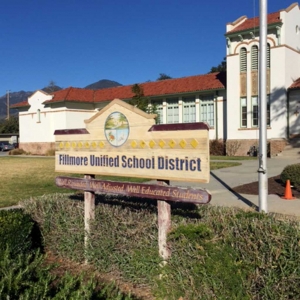|
Adult Education Program Approved by Board
By Jean McLeod — Wednesday, February 17th, 2016
 At Tuesday's Fillmore Unified School District (FUSD) Meeting the Board of Trustees approved the application for a County-District-School Code, which is the first formal step in creating a Fillmore Adult Education Program (FAEP). The funding for the program comes from a $504,409 Adult Education Block Grant the district recently received and not out of FUSD's General Funds. In the past FUSD had offered Adult Education classes, but they were through Ventura College who ran the program. The FAEP is now going to be offered through the District's own program. FUSD started offering a limited class schedule of Adult English as a Second Language (ESL) and Computer/Tech Literacy at Sespe Elementary since 2015. To meet the growing needs of the community new classes will be offered that include a General Education Diploma (GED), on-line classes to obtain a High School Diploma and carrier technology. FUSD will be working with other Adult Education Schools in the county including Ventura College. Classes will be taught in the local schools and will have zero impact on FUSD's K-12 Budget. Anthony Ibarra, Director of Technology, along with two new FUSD Computer Specialist employees Gill San Jose and Robert Ash, gave an update on the District's Technology Services. Ibarra informed the Board that in two years the present network will be far outdated. Presently the system broadband is just barely sufficient with 500 Mbps, (mega bits per second), but will need 4,000 Mbps in 2018 and the Wide Area Network (W.A.N.) which is the district wide connection speed to schools is presently 1 Gbps (gigabyte per second) and will also not be adequate in 2018. The Local Area Network (L.A.N.) within a school will also be obsolete in 2018 and must have an upgraded network path of travel with the installation of fiber optic solutions that is scalable and support from 1 to 10G speed. Ibarra informed the Board his department is in the process of setting up a campus network that will replace outdated cables, outdated equipment, install wireless and update the phone system and is expected to be completed next month. At present only faculty and staff have access to Office 365, but the District will soon be adding students which will allow the students to install the full Office application on up to 5PC's or Macs at home for free. Ibarra suggested the District start looking for the $2,560,000 needed to upgrade next year to 10G speeds along with a new location for the datacenter that has backup power and the other upgrades needed. Ibarra presented a breakdown of cost for each upgrade: Horizontal Cable $450,000, Network Equipment $900,000, Telephone System $350,000, Wireless $250,000, Servers $150,000, Power Backup $120,000, PA/Bell/Clock Intercom $200,000, Workstations $140,000. Assistant Superintendent Martha Hernandez briefly presented to the Board regarding the State requirement for a Single Plan for Student Achievement (SPSA) and what it entails. FUSD is in the third year of Program Improvement (PI) and the State of California requires documentation of student improvement and the documented plan the District will use to achieve it. SPSA forms the basis for all Title 1 funds which is the federal Elementary and Secondary Education Act passed in 1965 (currently know as No Child Left Behind) that provides funding to local school districts to improve the academic achievement of disadvantaged students. Districts must submit to their state education agency a plan stating how the funds will improve academic achievement. In developing the plan the California Education Code requires school districts work together with a School Site Council (SSC) which consists of parents, teachers, administrators and others in developing the SPSA and addressing how the funds are to be used to improve student performance. The SPSA must be reviewed by the SSC annually and updated, and has the decision-making authority, including proposed expenditures of funds. The implementation of Common Core State Standards has given California school districts additional time to bring their academic achievement out of Program Improvement due to the first pilot year of testing which was not used to evaluate student progress. Where FUSD stands regarding PI will be answered after the spring 2016 testing. |
